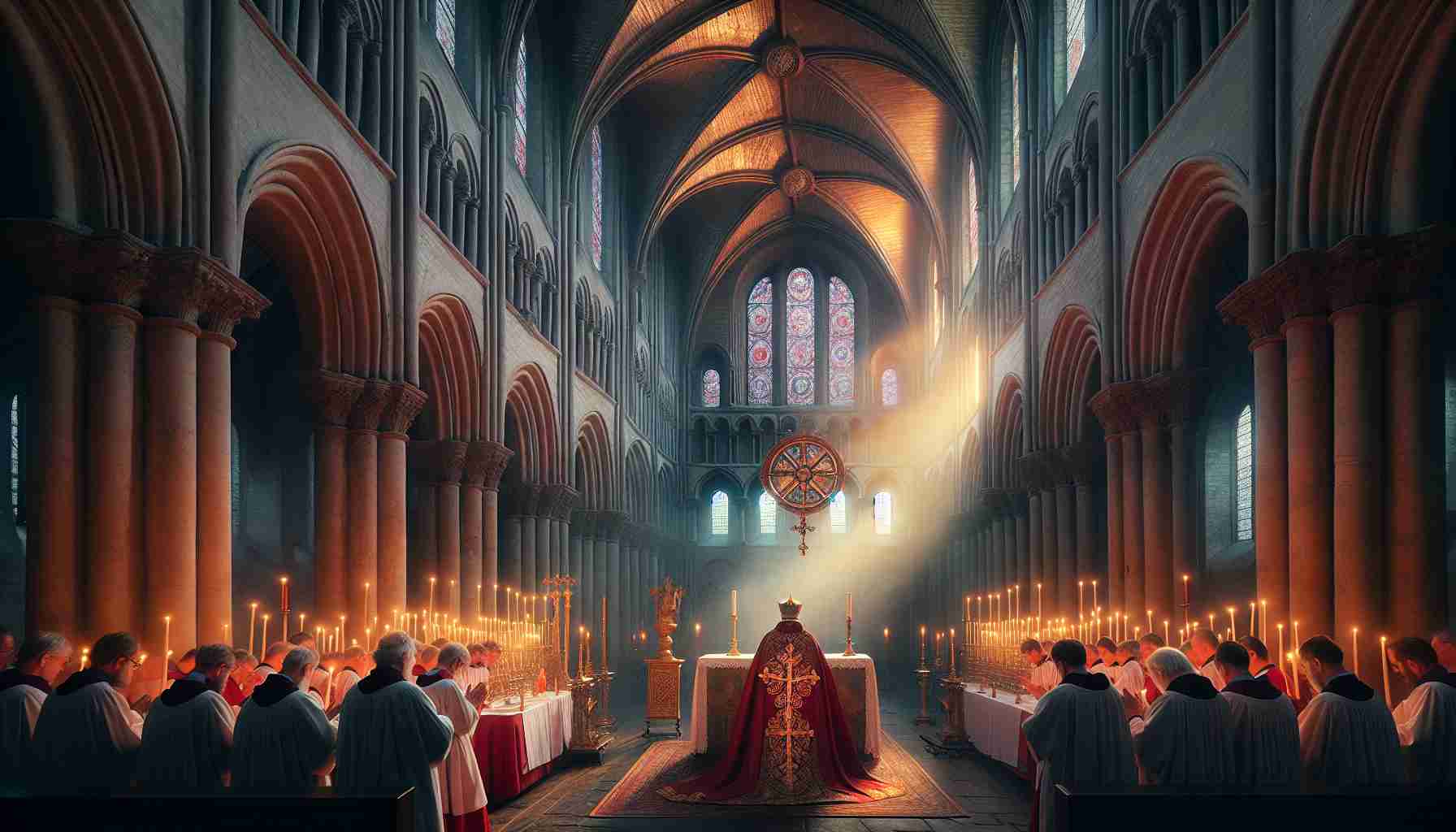

The dawn sky over Gniezno flushed with soft rose, feathered with mist, as the bells of the cathedral groaned into motion. Smoke clung to the stone towers, rising from the hearths of pilgrims and princes alike, gathering for history’s making. Inside the nave of Gniezno Cathedral, the air was heavy with frankincense, and banners stitched with golden eagles swayed in the high arches overhead. Murmured prayers echoed beneath carved vaults, each word weaving Poland’s soul closer to the cross.
Wordless, Bolesław Chrobry stood before the altar, his crimson robe rich with embroidered crosses, his shoulders broad and marked by twenty years of rule. Beneath his gaze, the relics of Saint Adalbert—martyred apostle to Prussia, twice sent by Bolesław himself—rested in their ornate crypt. Candles burned around the silver reliquary, their flames steady despite the hush of approaching history. He looked upward and did not flinch.
Psalm 33 lingered in whispered tones behind him: “Blessed is the nation whose God is the Lord, the people He chose for His inheritance.”
He had fought brutal winters in the Carpathians and forged uneasy truces from the Oder to the Bug. He had baptized with sword and sacrament, offering tribes not only conquest but communion. Now, the Holy Roman Emperor’s envoy stood beside the bishop of Rome, bearing from Pope Benedict VIII the sacred oil—recognition not merely of a ruler, but of a son of Christ leading a Christian land.
The crown, heavy with filigree and Baltic gemstones, rested on a velvet cushion. It had journeyed from Aachen by imperial decree, through courts and cloisters, watched over by monks who prayed over each step as a sacrament. Otto III, Bolesław’s late ally and friend, had promised more than alliance; he had believed Poland could be a beacon to the eastern world, a bastion of Christian unity. Even in death, that vision now gleamed in the cathedral’s golden morning.
As the bishop anointed Bolesław’s forehead, whispering consecrated Latin, silence fell like snowfall. The chalice kissed his lips. The crown touched his brow.
In that moment—June 23, AD 1018—a kingdom was born.
Peasants wept silent joy among the pillars, lips trembling with hymns. The nobles knelt in chain and velvet, swords sheathed not in fear but reverence. The great bronze doors swung open as choirs thundered the Te Deum, and sunlight as if summoned pierced through the clerestory, draping the king in pale dawn.
Not far beyond those doors, the cathedral's crypts whispered older stories—of Mieszko I, Bolesław’s father, who first accepted baptism in 966 and buried his heart with his faith. Back then, Poland was but a patchwork of tribes and blood feuds, the name barely whispered in Rome. But Adalbert came with the Gospel and disappeared into martyrdom. In time, the blood of saints soaked Slavic soil richer than kings could dream.
Legends say that angels walked beside Bolesław that day, invisible but present, guardians of a new Christendom. Others claimed the relics of Adalbert warmed to the touch as the crown was laid. These things the chroniclers wrote in margins with trembling hands—truth or divine poetry, no one could say.
In the weeks after the coronation, Bolesław sent riders to the outer frontiers with scrolls marked by the royal seal. Churches would be built in Lublin, Poznań, Wrocław. Monasteries would train Polish priests in Latin lore. Messengers were dispatched to Kiev and Constantinople with symbols of the crown and cross entwined.
Not all welcomed the change. In the forests beyond the Warta, pagan shrines still smoldered in secret. Warriors who once danced around sacred fires now sat silent in stone chapels, eyes wary. Yet the kingdom held. Not by chains—but by liturgy, scripture, and song.
Psalm 33 echoed in each act of statecraft and sanctuary: “He foils the plans of the nations… but the plans of the Lord stand firm forever…”
Sometimes, deep in the night when even the keep dogs slept, Bolesław walked alone to the tomb of Adalbert. There he would kneel. Not as king. As pilgrim. As brother to the martyr whose blood paved Poland’s path to faith.
One moonless night, years after the coronation, a traveler came to the cathedral—a monk not of Polish tongue, his cowl damp with road dust. Beneath the flickering light of votives, he stood before Adalbert’s relics and murmured in Greek a blessing older than Rome. When asked who he was, he gently replied, "A witness that light has reached even us."
He vanished by dawn.
Centuries later, during the Swedish Deluge and partitions, the crown of Bolesław vanished. Some say it was melted for coins, others that it lies buried beneath the cathedral still. The corona that made a kingdom now exists only in memory and myth, yet the kingdom remains—nurtured in psalms and stone, in baptism and bread.
Gniezno still breathes beneath its spires. And when the cathedral bells toll, some say they carry the echo of that ancient coronation—the moment a nation chose its God, and God chose His inheritance.
A Christian nation was born that day. Not by sword alone, nor by scepter—but by faith, forged like iron in the fires of devotion.